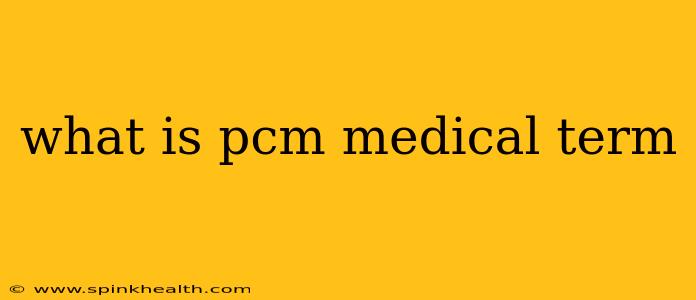The medical term PCM might seem cryptic at first glance, but it's actually a relatively common acronym representing Primary Care Manager or Personal Care Manager. Let's delve into the roles and responsibilities of these crucial healthcare professionals and explore some frequently asked questions surrounding the term.
What does PCM stand for in medical terms?
As mentioned, PCM most often stands for Primary Care Manager. This is the healthcare professional who coordinates a patient's overall healthcare needs. Think of them as the quarterback of your healthcare team, ensuring everything runs smoothly and efficiently. They're often the first point of contact for routine checkups, managing chronic conditions, and providing referrals to specialists when necessary. In some contexts, it may also refer to a Personal Care Manager, who helps individuals with daily living activities and healthcare needs, particularly those with disabilities or aging adults. The specific meaning depends heavily on the context in which you encounter the term.
What is the role of a Primary Care Manager (PCM)?
A Primary Care Manager plays a vital role in maintaining the health and well-being of their patients. Their responsibilities extend far beyond simply treating immediate illnesses. They are deeply involved in preventive care, early diagnosis, and the management of long-term conditions like diabetes, hypertension, and heart disease. They are often General Practitioners (GPs) or Family Physicians, but can also include other qualified medical professionals depending on the healthcare setting.
Imagine Sarah, a patient with a complex medical history. Her PCM takes the time to understand her complete health profile, including her family history, lifestyle choices, and existing conditions. He helps her manage her diabetes through medication, lifestyle counseling, and regular blood tests. When she develops a persistent cough, he doesn't just treat the cough but investigates the underlying cause, possibly referring her to a pulmonologist (lung specialist) if needed. This holistic approach to patient care is the hallmark of a great Primary Care Manager.
What is the difference between a PCM and a specialist?
The key difference lies in the breadth of their expertise. A PCM has broad medical knowledge and focuses on the overall health and well-being of the patient, providing comprehensive care. Specialists, on the other hand, have in-depth expertise in a specific area of medicine, such as cardiology (heart health), oncology (cancer treatment), or neurology (brain and nervous system disorders).
Think of it like this: your PCM is your general practitioner, providing primary care and coordinating care with specialists. If you need specialized care, your PCM will refer you to the appropriate specialist, creating a cohesive and effective healthcare journey. They often continue to coordinate care even when you are under the care of a specialist.
How do I find a PCM?
Finding a good PCM is crucial for your health. Most health insurance plans provide a list of in-network primary care providers. You can also search online directories or ask for recommendations from friends, family, or your current healthcare provider. Consider factors such as location, office hours, and the doctor's approach to patient care when making your decision. A good PCM will actively listen to your concerns, answer your questions thoroughly, and partner with you in managing your health.
Can a PCM prescribe medication?
Yes, in most cases, a Primary Care Manager can prescribe medication. The specific medications they can prescribe will depend on their qualifications and the relevant regulations in their jurisdiction. However, for complex cases or specialized medications, they may need to consult with or refer patients to specialists.
In conclusion, while the acronym PCM may seem unfamiliar, understanding its meaning—Primary Care Manager or Personal Care Manager—is critical to navigating the healthcare system effectively. The PCM plays a vital role in ensuring your overall health and well-being through comprehensive care coordination and proactive management of your healthcare needs.

